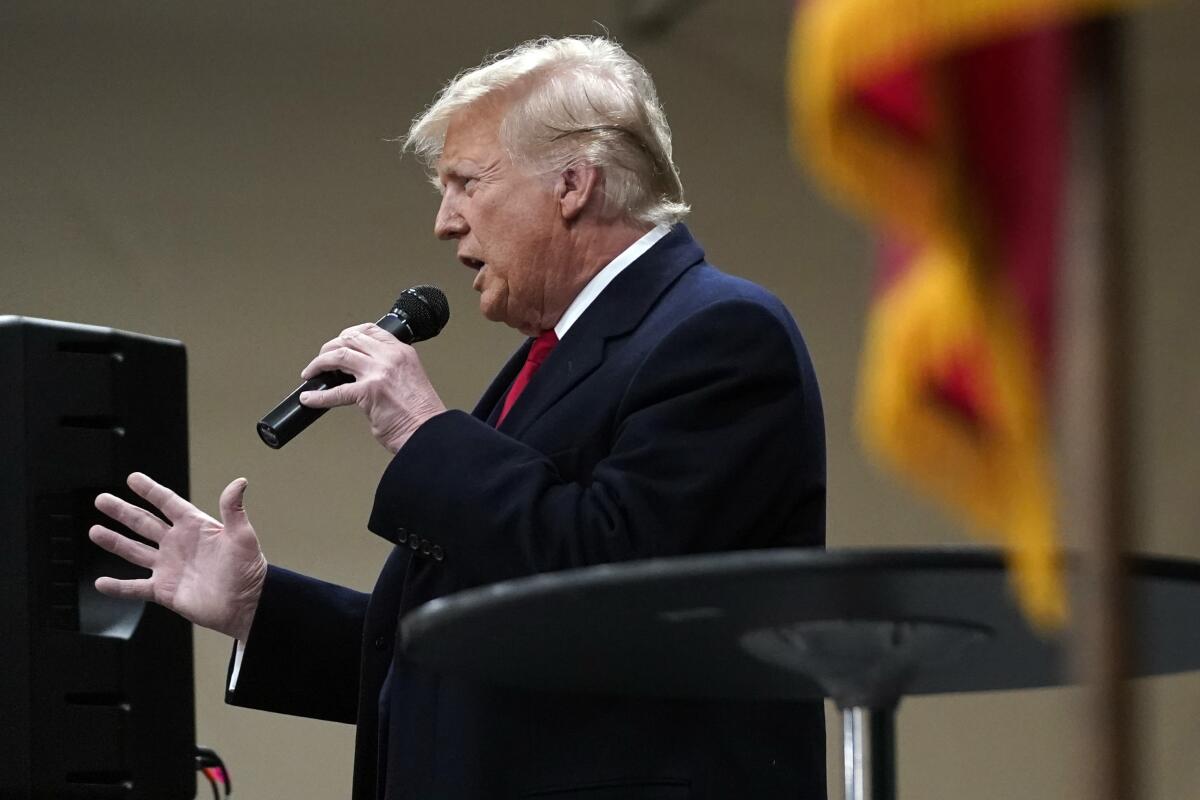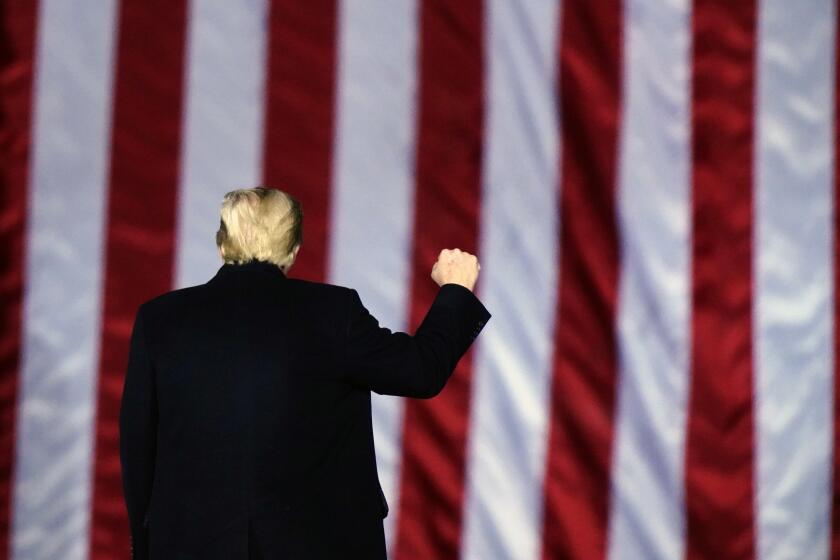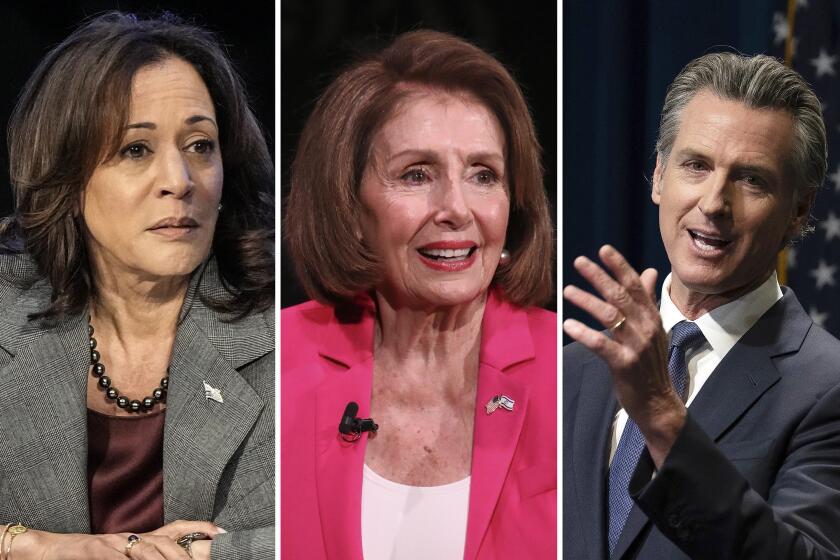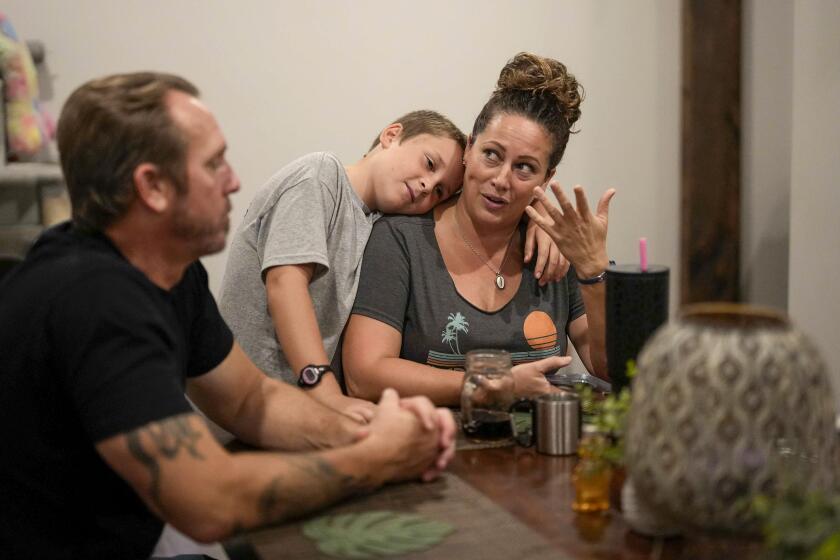Trump’s victory in Iowa puts him on track for comeback bid, despite criminal charges

- Share via
DES MOINES — Former President Trump has passed the first milestone in what his allies hope will be a quick march to a third presidential nomination.
The voting by Iowa Republicans on Monday moved the country closer to a presidential contest unlike any other in U.S. history: A defeated former president facing four criminal cases and multiple felony allegations — including an effort to subvert the last election — taking another shot at the White House.
Trump’s win in the Iowa caucuses came thanks to the resolve of his die-hard supporters, who turned out on a bitterly cold night that state officials described as some of the worst weather for a caucus in half a century.
Even before voting had begun at some caucus locations, the Associated Press and television networks projected Trump’s victory based on polls of voters entering the caucus sites and results from key precincts.
The swift announcement drew an angry reaction from Florida Gov. Ron DeSantis, who was projected to take second place, just a few percentage points ahead of former South Carolina Gov. Nikki Haley.
Has Biden’s standing in the state improved at all? How does Vice President Harris stand? And how much support does RFK Jr. pull (and from whom) in a general election matchup?
In a statement from his campaign’s communications director, DeSantis accused the news media of “election interference.”
“The media is in the tank for Trump, and this is the most egregious example yet,” the statement said.
Speaking to his supporters, Trump said he was honored by the early call, congratulated his opponents and called for unity in the GOP.
“It would be so nice if we could come together and straighten out the world and straighten out the problems and straighten out all the death and destruction we’re witnessing,” Trump said. “It’s going to happen soon.”
He called President Biden “the worst president that we’ve had in the history of our country” and pledged to “seal up the border” and “rescue our economy.”
With nearly all the vote tallied, Trump was holding just over half the total, with DeSantis and Haley each pulling about one-fifth. Businessman Vivek Ramaswamy was far behind in fourth place and was expected to drop out of the race.
The weather and the lack of suspense about the outcome did lead to sharply lower turnout than in 2016, when more than 180,000 Iowans took part in the GOP caucus. This time around, Iowa Republican officials said about 100,000 voted.
The near-tie for second could mean that the Iowa result won’t have much effect on either the Haley or DeSantis campaigns’ ability to move forward to the next contest, in New Hampshire next week, where Haley has been gaining ground, but DeSantis has been largely absent.
Despite her projected third-place showing, Haley claimed to have the momentum needed to overtake Trump in future contests and told her supporters, “I can safely say tonight, Iowa made this Republican primary a two-person race.”
“Seventy percent of Americans don’t want another Trump-Biden rematch,” she said. A rerun of the 2020 contest would result in another close election, but Haley said she would beat Biden “in a landslide.”
Haley is well positioned to overtake Trump in New Hampshire, where moderate voters and independents are a much larger share of the electorate than in Iowa.
After that, however, her prospects dim. Trump continues to have a huge lead in Haley’s home state, which votes in February, as well as in many of the 15 states that vote on March 5, this year’s Super Tuesday.
In California, for example, Trump currently has the support of two-thirds of likely GOP voters for the March 5 primary, according to a UC Berkeley Institute of Governmental Studies poll, co-sponsored by the Los Angeles Times, which was released Monday morning. Trump is on track to win all of the state’s delegates to the GOP convention, which amount to 14% of the votes needed for the nomination.
Democrats did not hold a presidential caucus Monday. The party flubbed the 2020 caucuses so badly that no winner was ever formally named. Amid concerns that Iowa’s overwhelmingly white population did not represent the nation’s changing demographics, Democrats last year decided to begin their nominating contest with primaries in South Carolina and Nevada.
After the race was called for Trump, the Iowa Democratic Party issued a statement outlining the case that Democrats plan to make against the former president.
As he campaigned in Iowa, “Trump showed us exactly what he would do to America if he gets the chance: ban abortion nationwide, cut Social Security and Medicare, make our communities less safe, and give handouts to the wealthy while raising costs on middle-class families,” the statement said.
GOP politicians in Iowa slammed California and its leaders in the run-up to the first presidential nominating contest in the nation Monday.
Monday’s results showed that Trump retains the fervent backing of his loyalists. His margin of victory was on track to break the record for a contested Iowa Republican caucus, set in 2000 by George W. Bush.
Unlike a primary, where voters can cast a ballot at any time during election day — and in many states for weeks before the election — caucuses require voters to attend at a specific time, typically starting at 7 p.m., and stand in front of their neighbors to announce whom they back.
At the 1,657 precinct-level caucus sites around the state, supporters of the candidates delivered speeches, often expressing the grievances and anger that have animated many Republican voters about the border, pandemic-era lockdowns and perceived bias against conservatives.
In preelection polls, Trump voters were far more enthusiastic about their candidate than were backers of the other candidates, and that enthusiasm carried over to caucus night.
“There is a great awakening happening across the country right now,” said Kathryn M. Heilesen, a certified public accountant in Denison, a small city in western Iowa, who was a caucus captain for Trump. She did not clarify her reference to the “Great Awakening,” a phrase that dates to 18th century evangelism in the U.S. but in recent years has been picked up by devotees of QAnon conspiracy theories.
Heilesen’s vote for the former president was a matter of faith but also of prophecy, she said. “And you just need to listen to the prophets — if you listened to them in 2016, they predicted this,” she said.
Although the population of Crawford County, where Denison is located, is almost 30% Latino, the caucus turnout was almost entirely non-Latino white voters.
Nearly half of Trump’s supporters described themselves as “extremely enthusiastic” about their candidate, according to a Des Moines Register-NBC-Mediacom poll of Iowa voters conducted last week. By contrast, only 9% of former United Nations Ambassador Haley’s backers were similarly excited, as were 23% of voters for DeSantis.
Trump led among all demographic groups tested in the poll but was especially strong among voters who identified themselves as evangelical Christians and the 4 in 10 likely caucus voters who labeled themselves as backers of Trump’s “Make America Great Again” movement. Among Trump backers, 60% called themselves either “ultra MAGA” or “regular MAGA,” the poll found.
Sara O’Neil and her family moved from California to Iowa, fleeing COVID restrictions. Now they’re part of a group with influence to pick the next Republican presidential nominee.
About half of Haley’s supporters identified as “anti-MAGA,” while 1 in 10 said they were MAGA supporters.
DeSantis voters fell between those two poles, with more than half saying they were neutral toward the MAGA movement, the poll showed.
Kurt Moore, 54, a DeSantis supporter in Ames, home to Iowa State University, said he hadn’t caucused in past elections because “sometimes you know you’re not going to change anything.” This time, he said, he would have “driven through a blizzard” to take part.
“A lot of us think we’re coming to an end as a country if we don’t take a new direction,” he said. “We have a great country ... only if we don’t destroy it. Now with all these people flooding across the border ... people’s tax dollars [are] being used to house illegal aliens in schools. We don’t know what a man or a woman is. It’s a mess, and we have to fix it.”
Voters are “willing to go out in 2-degree weather to fix it,” he added, looking at the roughly 120 people gathered in a crowded elementary school cafeteria for their caucus.
Nearby, two more DeSantis supporters, Ami and Rolf Duvick, said that they supported the Florida governor because Trump had backed lockdowns during the early months of the COVID-19 pandemic.
“In a nutshell, we really liked Trump, but DeSantis led way better when it came to COVID,” Ami Duvick said. Trump should have fired Dr. Anthony Fauci, the former head of the federal government’s National Institute of Allergy and Infectious Diseases, she added.
In Iowa, as elsewhere, Haley appears to have consolidated the support of those who have rejected Trump, including disaffected Republicans, independents and some Democrats who crossed over and participated in the Republican caucus, which Iowa’s rules allow.
She appeared to be doing best in precincts with high percentages of college-educated voters, a result consistent with the preelection polls that showed her having her strongest support among two groups that have consistently resisted Trump: suburban voters and white women with college degrees.
The Des Moines Register poll found that about half of Haley’s supporters were independents or crossover Democrats, and only 23% said they would vote for Trump in a November rematch against President Biden. By contrast, 43% said they would vote for Biden, while the rest backed one of several third-party or independent candidates.
Trump’s criminal liability did not bother the vast majority of likely caucusgoers, the poll found: 6 in 10 said that if Trump were convicted, it would have no effect on their support for him in November, and 2 in 10 said a conviction would make them more likely to vote for him. Roughly three-quarters of likely caucus voters said they expected Trump, despite his legal problems, to beat Biden.
Only 2 in 10 likely caucus voters said a conviction would make them less likely to support Trump, but among Haley’s voters, 4 in 10 said a conviction would make them less likely to back him.
Mehta reported from Des Moines, Lauter from Washington and Pinho from Ames. Times staff writer Jack Herrera in Denison contributed to this report.
More to Read
Get the L.A. Times Politics newsletter
Deeply reported insights into legislation, politics and policy from Sacramento, Washington and beyond. In your inbox twice per week.
You may occasionally receive promotional content from the Los Angeles Times.














